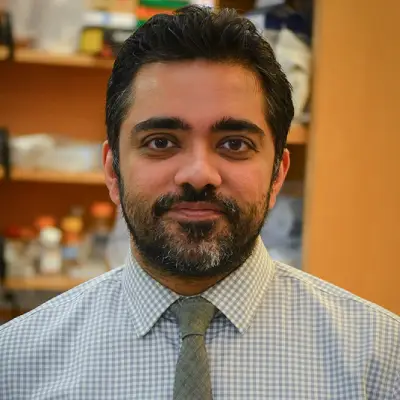As both a surgical oncologist and researcher at NewYork-Presbyterian and Weill Cornell Medicine, Rohit Chandwani, MD, PhD, meshes his scientific expertise with his experiences in the operating room to improve outcomes for patients with pancreatic cancer and broaden scientific understanding of the disease. While much remains unknown about the mechanisms behind this aggressive cancer, Dr. Chandwani and his team have found answers to questions about the relationship between inflammation, genetic mutation in the development of pancreatic cancer.
Dr. Chandwani and his colleagues recently published a paper seeking to define the biological basis for early-stage pancreatic cancer, and discovered that this group of patients are enriched for a specific mutation in KRAS at G12R. Comparing the outcomes of patients with KRASG12R mutant tumors to that of patients with KRASG12D mutant tumors, the authors demonstrated that different mutations in KRAS yield different clinical outcomes. Additionally, the team published research in December 2023 on epigenetic memory, discovering that long after having pancreatitis, mice remained susceptible to oncogenic stress.
Below, Dr. Chandwani discusses how this research is shedding light on why pancreatic tumors develop and his future work to improve treatment and prevention.
What was your motivation for conducting this research?
We've been trying to understand for a long time why some people get cancer, and others don't. We now know that up to 40% of us are walking around with mutations in KRAS in our pancreas, which is instrumental to the initiation and maintenance of pancreatic cancer. Yet clearly, the vast majority of that 40% of us are never going to develop pancreatic cancer.
We’ve known for a long time that the presence of a mutation in KRAS alone is not sufficient to transform a normal cell, that you require an additional insult. We think it is frequently inflammation, or pancreatitis. But the majority of patients who develop pancreatic cancer never had pancreatitis, so how is it that they come to acquire this instrumental risk factor?
What were your findings?
My team recently discovered that even transient inflammation has durable effects, and that you can separate an inflammatory insult from turning on a cancer-initiating mutation by a large amount of time — about three months in a mouse, or the equivalent of about five years in a human.
We trace this cooperativity between the two insults molecularly to the fact that when there is a transient inflammatory insult, the lasting molecular changes never go away. We retain what we call a memory of that inflammation, and that memory is encoded in the epigenome, which is the context in which DNA resides.
That memory of inflammation is what continues to lower the threshold for tumor formation over many months in the mouse, and we suspect this translates to many years in humans. What's exciting about this is not simply that you can separate these two critical factors in time, but now we can start to think about how to reverse that elevated risk in the therapeutic window that's offered by this several year period.
We showed in proof-of-principle studies that you could do this in a mouse: When mice would undergo a transient inflammatory insult, we could then reverse the effect on facilitating tumor growth by inhibiting some of the lasting molecular changes that happened after the original injury. This is unveiling a potential new cancer prevention strategy because all of us don't just respond in real time to exogenous insults or environmental stressors. We retain a durable capacity to remember that initial insult should we ever face it again.
What are the implications for humans based on your findings in mice?
We already know that people who have an episode of acute pancreatitis today have a persistent risk of developing pancreatic cancer that lasts five to 10 years, even though they fully recover from the acute illness. Though we knew they were at an elevated risk, until now, we didn't know exactly what to look for, because the sequelae of that episode of acute pancreatitis are not really detectable in any biopsy or imaging study.
Our work in mice suggests that the sequelae could be found through more in-depth molecular analysis of the pancreas. We’re now trying to extend this work into humans by using tissue from patients who have undergone total pancreatectomy to understand if this durable risk of developing cancer can in fact be detected through simple means in their pancreatectomy specimens.
What does the future look like for pancreatic cancer research?
We’re increasingly trying to answer some of these fundamental questions about why some people get cancer, and why some people fare better than others when they do get it. How can we modulate not only the risk of developing cancer, but change the trajectory of patients who become diagnosed with cancer?
It’s important to emphasize that, while we seek answers to those questions, there is progress being made. Our insights are deepening, and treatments are changing — in fact, there’s a critical set of drugs that are new therapeutic options that are becoming available now and in the next year or two. As both a physician and a scientist, I am able to see the broader landscape and to understand that while there is importance to what we can do now and to taking a wider look and understanding that things are constantly evolving and changing. I am hopeful for what the future will bring for patients with pancreatic cancer.




